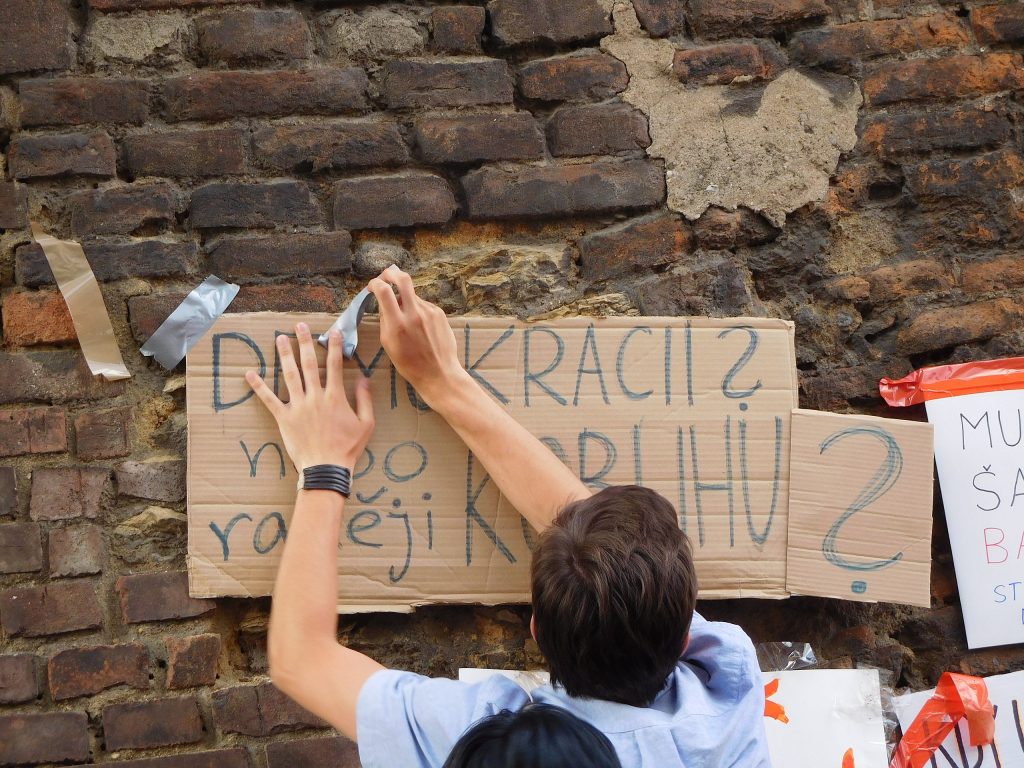Czech Republic: Velvet contradictions
The Czech Republic’s liberal government has taken up the Ukrainian cause as its own. But unless it starts offering solutions to a growing social crisis, labelling the opposition as Russia’s useful idiots may not be enough.
On 15 March 2022, the Czech public was stunned to find the front pages showing pictures of Petr Fiala – their pedantic, not to say dull prime minister – in Kyiv wearing a helmet and a bulletproof vest. At the time, the Russian invading forces were still within reach of the Ukrainian capital.
Bold gestures like this have been rare in Czech foreign policy for the past decade. But even more unusual was the proactive and confident diplomacy that followed. Shortly after the Kyiv visit, Vít Rakušan, the minister of interior, announced he would be pursuing a ‘hawkish’ position in a forthcoming meeting with his counterparts on the question of sanctions against Russia. And in autumn 2022, the Czech Presidency of the Council of the European Union was able to maintain consensus on support for Ukraine and, for the time being, stave off war fatigue among member states.
Immediately after the invasion, the Czech Parliament unanimously approved a declaration denouncing Russia’s ‘barbaric, inexcusable and unprovoked aggression’. However consensus over the country’s Ukraine policy quickly evaporated. The opposition started to criticize the government for not doing enough to shield citizens from the economic consequences of the conflict and instead for acting like a ‘Ukrainian government in exile’ – as the far-right leader Tomio Okamura put it.
The public was also divided in its perception of the conflict. In the spring of 2022, Czechs showed notable solidarity when they welcomed more than 400,000 refugees from Ukraine. By the autumn, however, part of the population had started to express concern at high inflation rates and rising energy prices. The anti-government demonstrations during the ‘Czech winter of discontent’ continue up to this day.
Although the organizers have claimed that their aim was to criticize the lack of action of government interest in the cost-of-living crisis, anti-Ukrainian sentiments were apparent among participants. During one of the protests, for instance, clashes with the police occurred when demonstrators tried to remove the Ukrainian flag from the National Museum in the centre of Prague.
But though there are differences in opinion about support for Ukraine in Czech politics and society, it would be mistaken to talk solely of a struggle between the ‘pro-Ukrainian’ and ‘pro-Russian’ camps. Instead, the debate needs to be seen in the context of broader conversation about the principles guiding Czech politics. In other words: the Czech debate about Ukraine is not so much about Ukraine, as about the Czech Republic.

Demonstration against Andrej Babiš, Prague 2018. Image: JiriMatejicek. Source: Wikimedia Commons
The velvet consensus
The populist and Eurosceptic opposition that emerged from around 2010 was a delayed response to the aftermath of the ‘Velvet Revolution’ of 1989. The ideological vacuum following the collapse of communism was quickly filled by the desire to westernize society. In geopolitical terms, this meant breaking free from the influence of the Soviet Union/Russia and integrating into western political institutions, above all NATO and the European Union (EU). In economic terms, westernization meant ‘transitioning’ from a planned economy to market-based capitalism. And in terms of social psychology, it meant rejecting the communist past and the values it represented, and introducing a liberal mindset centred on the free individual.
By and large, these aims were successfully fulfilled thanks to the strength of the so-called velvet consensus. The Czech Republic entered NATO in 1999 after negotiating the withdrawal of Soviet troops and joined the EU in 2004 in the first round of enlargement. The economy was significantly restructured, opening up space for small-scale business ventures as well as foreign investment. There was general agreement that the previous regime had been criminal; its successor – the Communist party of Bohemia and Moravia – was politically isolated. Liberalism was the dominant ideological frame in public discourse.
Of course, there were problems, including the not always transparent privatization of state property, corruption scandals and a wave of rightwing violence primarily targeting Roma. However, there was a shared perception that these were the diseases of a young democracy that would be overcome by further approximation to a western way of life and governance.
This optimism vanished as the premises of the velvet consensus were gradually undermined by their internal contradictions. After the country’s successful integration into western institutions, foreign policy became rudderless and marginal to the interests of the political elite. The collapse of the government during first Czech Presidency of the Council of the European Union in 2008 was symptomatic of this tendency. The government had intended to use the Presidency as an opportunity to demonstrate the reliability of the Czech Republic as a partner on the international stage. But because the opposition had no plans for how to rule the country in the aftermath, a caretaker government consisting of bureaucrats had to take over the Presidency. The affair was deeply embarrassing for the country. This foreign policy vacuum allowed for the slow but steady rise of opinion questioning the status quo. Particularly the right-wing Civic Democratic Party (ODS) became a hotbed of Euroscepticism.
Poorly regulated and often clandestine privatization caused the emergence of a new business elite consisting largely of former members of the communist nomenclature. These were the only people able to summon the necessary resources, their contacts and knowledge allowing them to benefit from the rapidly changing economic dynamics. For these nouveaux riches, the imperative was to remain closely connected to political parties, which allowed them to benefit from state contracts and public funds. When the public grew more and more frustrated with these corrupt schemes, politicians were forced to react. In 2009, the ODS chairman Mirek Topolánek declared the fight against regional ‘godfathers’ in the party as one of his top priorities.
Popular dissatisfaction increased further in connection with the economic crisis that hit the country the same year. People had hoped that over time the standard of living would come to compare with that in western states. But the liberal mindset of rightwing government led to austerity policies that protracted the crisis and even made it more painful, postponing prospects of improvements in material circumstances indefinitely.
The already discredited velvet consensus was dealt the final blow in 2013, when the highly unpopular centre-right coalition government collapsed after a lurid scandal involving the prime minister’s secretary and mistress, the abuse of the intelligence services for amorous intrigues, and bribes from shadowy lobbyists in the form of handbags. The impact of the affair was exacerbated by the public’s frustration with the protracted economic crisis. It was hardly surprising that a significant part of Czech society started looking for political forces that offered an alternative.
Illiberal newcomers
That power dislikes a vacuum was demonstrated in 2013, when three new players entered Czech politics and changed its dynamic for good. Despite representing quite different interests, they found themselves in the same camp and became occasional allies in day-to-day politics. This process accelerated after they began criticising corruption and the elites. But the ideological trajectory of these pragmatic politicians was largely shaped by circumstances, above all the so-called refugee crisis in 2015. This demonstrated that there was a strong demand for isolationist and nationalist policies. Following popular opinion, the newcomers began advocating a more coherent worldview that did not criticise specific elements of the Velvet consensus so much as represent its illiberal antithesis.
The first of them was Tomio Okamura, a businessman of Czech-Japanese origin who had made his name in the tourism industry. He worked tirelessly on self-promotion, writing books about business strategies, publishing a video blog and taking part in the Czech iteration of The Apprentice. In 2012, Okamura capitalized on his popularity and successfully ran for the Senate. He started his own political party, Dawn of Direct Democracy, which won nearly 7% of votes in the parliamentary elections the following year. As the name suggests, the key component of the party’s agenda was the introduction of referendums and other instruments of direct democracy into the political system. On a more emotional level, the agenda appealed to popular mistrust towards elected representatives and a desire to return power to the hands of ordinary people.
Okamura’s first political project collapsed after internal quarrels over the party’s finances. However, he did not give up and, in 2015, founded a new party – Freedom and Direct Democracy (SPD). Despite the name, the new party had a different agenda: Okamura started to criticize the EU and the Czech political system, as well migration from Muslims countries. This rhetoric enabled him to dominate the Czech far-right and win 10% of the vote in the parliamentary elections of 2017.
Okamura was now an important powerbroker, with the minority government formed after the election dependent on the support of the SPD. Okamura also succeeded in navigating the coronavirus pandemic, after some of his MPs radicalized and started to endorse conspiracy theories, before eventually splitting from the party. Despite having to compete for anti-establishment votes in the 2021 parliamentary elections, the SPD reaffirmed its position and again won roughly 10%.
Another political player to emerge in 2013 was Miloš Zeman, who became the president in the first popular vote held for this office. Zeman was not exactly a newcomer: he had led Social Democratic Party (ČSSD) in the 1990s and been Prime Minister between 1998 and 2002. He had even tried to run for the presidency in 2003 but had been betrayed by his comrades, who concluded that it would be better to send their former boss to retirement.
The introduction of the popular vote presented a unique opportunity for Zeman to make a political comeback. He had always been a skilful populist, a skill he demonstrated once again in 2013 when he presented himself as a champion of ordinary people – the ‘bottom ten million’, as he put it. This was a clever way to position himself, since his opponent in the run-offs was Karel Schwarzenberg, a minister of an unpopular government with German aristocratic origins. Zeman won with 54.8% of the vote.
Already then, his rhetoric had nationalist undertones. But as his presidency continued, he became openly xenophobic, repeatedly expressing anti-Muslim prejudice. This became the centrepiece of his election campaign in 2018, when he defended his mandate. He continued to employ confrontational rhetoric and presented himself as an alternative to vaguely defined liberal elites – nicknamed ‘Prague coffee house’. Despite his largely ceremonial role, Zeman tried to actively intervene in politics and to emphasise the need to reconsider the country’s foreign policy and pursue a pragmatic and multi-vectoral approach. In practice this meant increasing orientation towards Russia and China. Although Zeman’s influence decreased over time, partly due to his deteriorating health, his style informed the rhetoric and agenda of various political actors, and his legacy remains visible even after he left office at the beginning of 2023.
The third actor whose political career started in 2013 was the billionaire and agriculture mogul Andrej Babiš, a former member of the communist nomenclature who became immensely rich during the privatisation in the 1990s. Babiš had always maintained close connections with politicians in order to keep his business expanding, however this did not prevent him from developing the image of an outsider challenging the corrupt party system – which he nicknamed ‘Palermo’, in reference to the Italian mafia.
Babiš original appeal was also based on his business success, his supposed efficiency and ability to deliver tangible results. This image made his party ANO (the acronym stands for the ‘Alliance of Dissatisfied Citizens’) the second strongest party in the parliamentary elections of 2013. Babiš was appointed the minister of finance. In government, he completely overshadowed the nominally stronger social democratic ČSSD and took over its voters. This move allowed him to win the elections in 2017 and become prime minister.
Up to this point, Babiš rhetoric had been ideologically hollow, instead emphasising managerial skills and a technocratic governance. But his partnership with Zeman and Okamura gradually radicalised his position. This became particularly apparent in the parliamentary elections in 2021, when Babiš began using fear-mongering tactics in connection with migrants. After the Russian invasion of Ukraine, he argued for keeping out of the conflict and achieving peace as soon as possible. This message became one of the main components of his bid for the presidency in 2023. Though unsuccessful, Babiš was able to gain the support of two and a half million voters and remains the strongest political player in Czech politics.
The trajectories of Okamura, Zeman and Babiš chart the emergence of the challenge to the velvet consensus in Czech politics. Starting from vague anger about the corrupt elite and disappointment with economic and social development, the opposition formulated its own vision of Czech society. This proposes a pragmatic foreign policy in which membership in western structures are not perceived as necessary. On the contrary, EU membership (and even membership of NATO) is seen as being disadvantageous since it makes it more difficult to pursue the country’s interest and respond to the demands of citizens. This foreign policy position has led to a clash with the liberal elite not only in politics but also in the media and other high-profile institutions – a clash from which opposition parties have benefited, since it allows them to present themselves as the true champions of the people.
The liberals rally
Adding to the pressure placed by these illiberal political actors on the established political parties is the emergence of new competitors on the liberal part of the political spectrum too. The voters of established ODS and Christian Democrats has started to be targeted by TOP 09, Mayors and Intendents (STAN) and the Pirate Party. The result has been a fragmentation of the political camp. This can be best exemplified by the results of the parliamentary elections in 2017, after which all the liberal political parties mentioned entered parliament, without any of them receiving more than 11% of the vote. Babiš’s ANO dominated these elections, winning 29.6% of the vote and winning in every region. As prime minister, Babiš was now tasked with forming a government. To make matters worse for the liberals, its preferred presidential candidate in 2018, Jiří Drahoš, lost against Zeman. At this point, it seemed that the velvet consensus was beyond saving.
Disparate liberal forces were now forced to discuss electoral coalitions. This process was complicated by personal grievances, programmatic disagreements and different strategies vis-à-vis the illiberal actors. The liberal parties had to suffer electoral defeat to understand that their marginalization was a very real possibility. Only then were they willing to compromise. In 2020, the ODS, TOP 09 and the Christian Democrats formed the SPOLU (Together) coalition. The newly united liberal forces now started to cast themselves as defenders of the velvet consensus, framing their mission in security terms.
The Russian annexation of Crimea in 2014 brought foreign policy back to the fore. The liberal parties argued that the revival of Russian imperial ambition in eastern Europe presented a direct threat to Czech security, occasionally giving the impression that it was only a matter of time before the country was itself invaded. There was much talk of hybrid war and disinformation featured prominently. These terms were useful for liberals because they enabled concerns about national security to be turned against domestic political opponents. Figures such as Okamura or Zeman, who were sympathetic to the Kremlin regime and surrounded by associates with murky ties to Russian entities, positively invited this kind of criticism. But labelling these politicians ‘Trojan horses’ or ‘useful idiots’ also tended to obscure their pragmatic agendas and to disregard the reasons for their significant popularity.
At a more basic level, the proponents of the velvet consensus saw themselves as fighting for the ‘spirit of the Czech nation’, whose place in the western community they argued would be lost were the country again to succumb to the barbaric East. Babiš, who had been a member of communist nomenclature and probably an informant for the secret service, was a particularly easy target for this kind or rhetoric. The liberal parties were quick to present Babiš as an evil force threatening to destroy Czech democracy. In one PR campaign, they compared him with the Russian president: while the country was facing ‘new threats’, so the message, they were represented by ‘same agents’.
Concerns about Babiš were undoubtedly justified. His wealth, ownership of media houses, and clique of loyal collaborators had allowed him to gain a problematic degree of influence. Yet to depict him as a product of communism misses the point: more than anything else, he is a by-product of the wild-west capitalism of the 1990s, the heyday of the velvet consensus.
Despite such distortions, the ‘militant democracy’ rhetoric resonated among certain segments of the Czech public – as the ‘Million Moments for Democracy’ demonstrations in 2019 showed. This popular movement was able to organize the largest demonstration since 1989 and likely motivated political parties to put aside differences and former grievances and form coalitions for the 2021 parliamentary elections. The Pirate Party and STAN now also joined forces to form a second liberal coalition alongside SPOLU. However, ANO still dominated in the opinion polls. The election campaign was accompanied with heated rhetoric from both camps. ANO focused its negative campaigning on the Pirate Party, accusing it of supporting migration from Muslim countries. SPOLU ramped up the rhetoric of existential struggle, depicting the elections as the last chance to save Czech democracy, and eventually managed to win by a very close margin and form government with the Pirate Party and STAN.
However, the victory of the liberal camp was only possible because a million votes – or 20% – went to parties that fell short of the parliamentary hurdle. To interpret these elections as an overwhelming reaffirmation of Velvet consensus values would therefore be mistaken. Czech society remained disunited, and nothing showed this more clearly than reactions to the Russian invasion of Ukraine.
Back to Babiš?
The reaction of politicians and the public to the Russian invasion of Ukraine illustrated the main dividing line in current Czech politics. Parties endorsing the velvet consensus were convinced that the outcome of the conflict in Ukraine would be decisive for Czech sovereignty. Their support for the Ukrainian cause was partly driven by the perception that like Czechoslovakia in 1989, the country was experiencing its own moment of return to Europe. The fact that Ukrainians were willing to shed their own blood to defend their version of the velvet consensus reaffirmed in minds of Czech liberals the relevance of their own values.
However, for another segment of society, there is no such connection between the fates of the two countries. Nationalist politicians argue that the Czech Republic has no obligation to get involved in the conflict, especially since it lacks the capacity to alter the outcome. This camp prefers a passive and pragmatic approach to pursuing country’s best interests, which in this is a case quick end to the conflict.
This debate is likely to resurface at the European Parliamentary elections in 2024. According to rumours, Babiš is already preparing a confrontational campaign that will target not only his political opponents – who he has already said are directed from Brussels – but the EU as a whole. It is quite possible that he will achieve significant success, given that Czech citizens continue to experience economic hardship and the current government seems incapable of offering solutions. The electoral beneficiaries are likely to be the parties of the nationalist camp, including the SPD and the extra-parliamentary figures already organising anti-government demonstrations.
The European elections will also be a crucial test for the unity of the camp endorsing the velvet consensus. Not only because relations between the parties of the governing coalition are far from rosy, but also because the ODS itself is ambivalent. Historically, the party was a nest of Czech Euroscepticism and its conservative segment is still influential. There is always the possibility that this wing, which is opposed to collaboration with more liberal parties, will gain the upper hand and turn for inspiration to like-minded actors such as the Polish Law and Justice party. If this were the case, it would create a significant challenge to the stability of the government and to prospects for the cohesion of the liberal camp.
Political competition in the Czech Republic is therefore likely to continue to revolve around the question of belonging to western institutions and cultural circles. In relation to the conflict in Ukraine, this line clearly divides government and opposition. But on other topics – such as further EU integration or climate change – it exerts less hold. However, any major alteration in the composition of the two electoral blocs is unlikely until the end of the war, which unfortunately is nowhere in sight.
Published 10 May 2023
Original in English
First published by Eurozine
© Jonáš Syrovátka / Eurozine
PDF/PRINTIn collaboration with
In focal points
- Living dead democracy
- Why Parliaments?
- Spelling out a law for nature
- No more turning a blind eye
- The end of Tunisia’s spring?
- Protecting nature, empowering people
- Albania: Obstructed democracy
- Romania: Propaganda into votes
- The myth of sudden death
- Hungary: From housing justice to municipal opposition
Newsletter
Subscribe to know what’s worth thinking about.
Related Articles

In this edition of the Gagarin podcast, we talk with Per Nyholm, a seasoned journalist whose multiple visits to Ukraine’s front line provide stark, first-hand insights, critical of Trump’s bullish intervention. The Danish reporter also holds strong views on the US President’s land-grabbing plans for Greenland.

Protest is one of the public’s foremost political tools in a democracy. Taking to the street can change laws, bring down a president and transform the fate of a nation. But it tends to come at a price.






